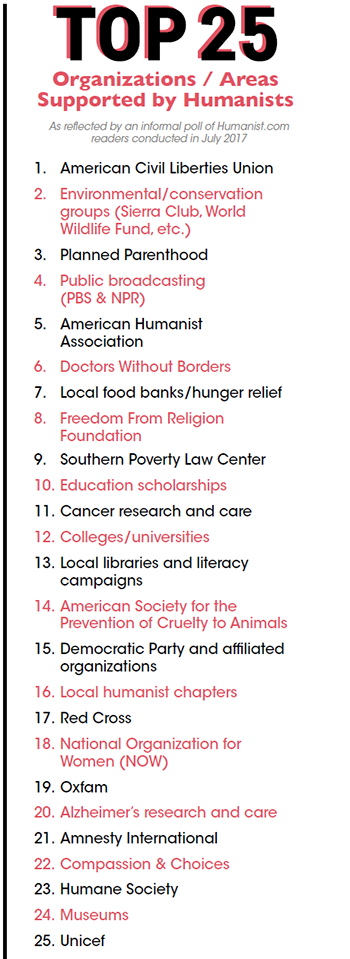Making Good: Humanist Philanthropy and the Duty to Give
 © Nvnkarthik | Dreamstime.com
© Nvnkarthik | Dreamstime.com WHILE RELIGIOUS COMMUNITIES have long been touted as philanthropic and generous, with many datasets showing that religious people give more money to charities compared to their secular counterparts, humanism prides itself on compassion and mutual respect without the need of a higher power. Therefore, it’s an understandable frustration that religious institutions, even when criticized for discriminatory practices and beliefs, are still seen as the archetypes of giving. They feed the hungry and fight poverty. They help those dying of disease and they rescue those in war-torn areas. The nonreligious, it’s often assumed, have so much less motivation to engage in charitable or philanthropic work and fewer direct avenues to do so, the common thinking goes. However, such perceptions don’t encompass the full story when it comes to humanists and their charitable giving.
Both domestically and internationally, there are important elements to religiously motivated giving that ultimately undermine real progress and highlight how the generosity of nonreligious people can be just as, if not more, beneficial to society.
The Connected to Give project is sponsored by a number of independent and community foundations that set out to explore the nature of charitable giving in the United States. They’ve issued a number of reports in recent years that explore the patterns and relationships found in people’s charitable contributions. One of their key findings in the third report, “Faith Communities” (released in 2014), offers important insight as to why there are these preconceived notions of overt religious generosity.
The report found that 73 percent of the total amount of American giving goes to religiously identified organizations. This encompasses two groups: congregations and organizations that work towards their goals under a religion-based framework. While this means a vast majority of all donated money is going to causes and organizations tied to religion, it actually doesn’t mean that a majority of people are supporting them. This is clearly evidenced by the fact that of the 63 percent of Americans who give at all, 53 percent of them give to organizations that have no religious ties. So we’re looking at a smaller percentage of people giving to sectarian philanthropic efforts at a higher rate: a median of $375 to congregations and $150 to religiously identified organizations. These numbers paired together make up that 73 percent of all money donated in the United States. On the other hand, the median amount going to secular organizations is only $250, but more secular people are giving. Indeed, there is a bulwark of support for charities that have no ties to religion and that help people by promoting the common good.
These statistics help explain the report’s vital finding that “Americans with religious or spiritual orientations give at higher rates primarily because they give more to organizations with religious ties.” Therefore, religious communities are often reported as giving at higher rates than secular communities because they’re giving more to churches than other organizations. The report found that 51 percent of religiously affiliated people gave to congregations. Incidentally, in an informal poll of 217 readers of TheHumanist.com conducted in July of this year, we found that 43.7 percent gave to the American Humanist Association or another secular advocacy group. Just as the religious donate to support and advocate for their beliefs and values, so do humanists.
 CHARITABLE WORK that extends past the borders of the United States has its own challenges. Disaster relief efforts in Haiti after the devastating 2010 earthquake exemplify how religiously motivated efforts to help those less fortunate can actually do more harm than good, especially when compared with the actions taken by the AHA in responding to the tragedy. While the various Christian missionaries who had been in Haiti long before the earthquake were vital to the disaster relief, the new wave of Christian groups and organizations that entered Haiti right after the earthquake seemed more compelled to capitalize on an opportunity of trauma in order to find new converts than to offer true, productive help. As Jonathan J. Bonk, director of the Overseas Ministries Study Center in New Haven, explained in 2010 to the New York Times, “The new or short-term groups see themselves as being there to save souls first and lives second” while “the older, less conservative missions often see it the other way around.”
CHARITABLE WORK that extends past the borders of the United States has its own challenges. Disaster relief efforts in Haiti after the devastating 2010 earthquake exemplify how religiously motivated efforts to help those less fortunate can actually do more harm than good, especially when compared with the actions taken by the AHA in responding to the tragedy. While the various Christian missionaries who had been in Haiti long before the earthquake were vital to the disaster relief, the new wave of Christian groups and organizations that entered Haiti right after the earthquake seemed more compelled to capitalize on an opportunity of trauma in order to find new converts than to offer true, productive help. As Jonathan J. Bonk, director of the Overseas Ministries Study Center in New Haven, explained in 2010 to the New York Times, “The new or short-term groups see themselves as being there to save souls first and lives second” while “the older, less conservative missions often see it the other way around.”
Free from the dogmatic need to proselytize, the AHA’s response to the tragic earthquake was more focused on working with experts in the area who were familiar with the local context. The AHA worked with Sebastian Velez, an evolutionary biologist at Harvard who had a long history of charity work on the Haiti-Dominican Republic border. In partnering with someone familiar with the region and experienced in foreign aid, the AHA raised a total of $43,000 for supplies and relief in underserved areas outside of the capital of Port-au-Prince, which was overrun with volunteers, many of whom were inexperienced or unqualified.
A similar story occurred in 2015 after the earthquake in Nepal, where it was said that religious groups exploited the trauma felt by a majority Hindu population in order to impose their Christian beliefs. This was made evident in comments made to the Guardian by Mark Kosinski, an American evangelist who was volunteering in Aceh and said, “These people need food, but they also need Jesus. God is trying to awaken people and help them realize salvation is in Christ.” Suggesting that a natural disaster responsible for almost nine thousand deaths, over twenty thousand injuries, and the displacement of 3.5 million people was somehow an act of God meant to guide people toward a certain faith is not only crude and insensitive, but misses the point of generosity—helping people, no matter who they are or what they believe in, without expecting anything in return.
It’s for this reason humanist philanthropy through charity and aid remains so important. With compassion and empathy toward fellow human beings residing at the center of humanist thought, it’s no question there’s a moral responsibility for charitable giving and volunteering. However, humanists also value reason and critical thinking, which means that their philanthropy is not given for some divine or higher purpose—it’s given in order to effectively create change in the here and now.

© Rawpixelimages | Dreamstime.com
THERE’S AN IMPORTANT political dimension that could explain why the nature of generosity and giving differs between religious and non-religious people. In 2014 the Washington Post reported that of the states that gave the most to charity, the top seventeen of them (with the exception of the District of Columbia) had voted for Mitt Romney in the 2012 presidential election, while the bottom seven had all voted for Barack Obama. In the recent 2016 election these party lines remained intact, as the most charitable states of 2012 voted for Donald Trump and the least charitable voted for Hillary Clinton. The correlation drawn from 2012 (that could also be drawn in 2016) is that the most charitable states, the ones that voted by and large for Republican candidates in the last two presidential elections, also are the most religious states. However, it’s not religion that makes someone inherently more generous. Rather, religious values are deeply intertwined with a political-economic way of thinking that vilifies state generosity in favor of private generosity.
Today, looking at a list of states it would be very easy to politically categorize one or the other as a “blue state” or a “red state.” California, New York, Oregon, Vermont—blue. Georgia, Montana, South Carolina, Texas—red. It has almost become natural and innate for the coasts to vote for Democratic candidates and the south and the middle of the country to vote for Republican candidates. However, in reality, this regional distribution of party loyalty is actually a new phenomenon in the history of the United States. For a majority of the twentieth century, California voted primarily for Republican candidates and Georgia voted primarily for Democratic candidates. While under our 2017 political perceptions this fact may seem inconceivable, it actually makes a lot of sense. Georgia is a poorer state than California and one of the political-economic foundations of the Democratic Party is redistributing wealth—taking from the rich (in the form of income tax) and giving to the poor. It’s welfare and it’s big government and it makes sense for poor states to vote for that. However, they don’t vote for that anymore.
In fact, the majority of southern and middle (i.e. religious and poor) states haven’t voted for a Democratic presidential candidate since Jimmy Carter in 1976. The reason is Ronald Reagan. During the 1980 election, and throughout his two-term presidency, Reagan conflated conservative economic values (lower taxes) with conservative family values (based heavily on the Christian religion). This duplicitous pairing means that today, “good Christians” sacrifice state-sponsored public welfare in the name of Jesus Christ. Since the age of Reagan, time and time again Republicans have villainized the federal government and welfare as inefficient and unproductive while promoting the morality of Christianity. This means that the religious right views God, not the government, as the mechanism of giving. This provides an important explanation as to why religious people and religious states are considered more charitable even though it’s people in the godless, liberal states who are more amendable to giving more to healthcare, education, and public municipalities in the form of taxes and welfare provisions.
Therefore, the conception that religious means generous is truly erroneous when religion is equated with an economic philosophy and a political party that degrades the ability and position of our government to give to those most in need.
 BUT WHAT ABOUT humanist philanthropy? Who do humanists donate money to and how often? Where do they volunteer? What are some of the other ways humanists demonstrate generosity in their lives?
BUT WHAT ABOUT humanist philanthropy? Who do humanists donate money to and how often? Where do they volunteer? What are some of the other ways humanists demonstrate generosity in their lives?
In the informal poll of 217 TheHumanist.com readers conducted in July, we found that some of the most popular organizations for humanists to donate to were ones that supported and promoted the ability of our government to help and protect people. Other than the majority of respondents donating to secular advocacy groups, 26 percent of humanists also regularly donate money to the American Civil Liberties Union (ACLU). Following this are environmental or conservation organizations (including World Wildlife Fund, Nature Conservancy, the Sierra Club, and others) with 25 percent, Planned Parenthood with 22 percent, and public broadcasting (PBS and NPR) with 19.8 percent. Thirty-nine percent of respondents reported that they regularly made donations to specific charities every month and 46 percent reported making donations every year to specific charities. This clearly shows that humanists aren’t only dedicated to the separation of church and state, but to social justice, equal access, conservation, and free information.
Moreover, humanist generosity extends past formal donations to charities, as evidenced by the 27.5 percent of respondents who reported that they volunteer every single week in their communities either at food banks, tutoring refugees, or offering free child care. A little over 10 percent of respondents explained how in their daily lives, it was their time they were the most generous with. Whether that meant phone banking for a political candidate or sending flowers and a note to a hospitalized neighbor, it was clear those day-to-day interactions with the people in our communities are an important form of generosity for humanists.
So the next time you hear someone claim that religious Americans are far more generous than secular Americans, remember all the causes and organizations listed herein. Remember the time you’ve donated to helping others, or make a point to do so. Remember what Kurt Vonnegut said: “Being a humanist means trying to behave decently without expectation of rewards or punishment after you are dead,” and bump it up a notch. Make good on the attempt and establish “good without a god” as an observation rather than an aim.
